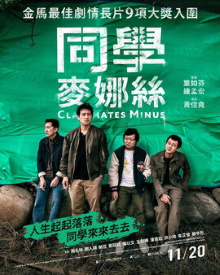I didn’t care too much for director Huang Hsin-Yao previous film The Great Buddha+, finding it too overwrought, but I found this dark comedy much more up my alley. It has all kinds of references to the first film and as it is mostly in Taiwanese, even with the help of subtitles I’m afraid I probably missed quite a few of them. But it’s still enough to appreciate its black humor and uniquely Taiwanese identity, not to mention the eminently relatable stories of four middle-aged friends.
The four have been friends since high school and despite their middle-age, their careers have stalled and their lives are going nowhere. Tian Zai is married and a director who wants to make films, but has to settle for making commercials. Guan Tou is always poor, spending his money on patronizing sex workers. Dian Feng is a decent insurance salesman, but his refusal to network and be much of a people person ensures that he never gets promoted. Bi Jie makes the paper constructs that are burnt as offerings to the dead. He stutters so much that most people can’t understand him when he speaks but he can seemingly communicate just fine with the dead. In this film each of them experiences an event that could change their lives. Dian Feng gets a girl who he meets in a comics shop pregnant. Bi Jie meets a widow who easily understands everything that he says. Guan Tou recognizes a former classmate who was once the school beauty he was secretly in love with but is now a prostitute. Tian Zai is invited to run as a local councilor as a puppet to replace the previous one who has been implicated in the scandal that was the subject of the previous film.
With four main characters and each of them having a quirky story of his own, it’s hard not to find something to be entertained by in this film. It’s uneven in that Dian Feng is the least developed character of the four and seems to be mostly there to support the other three. But all four stories complement one another in being about the miseries of middle-aged men making the whole better than the sum of its parts. What really shines through here is the self-deprecation and black humor in their stories. It’s totally ridiculous for example that the widow Bi Jie meets is able to somehow piece out the rest of his sentence just from the few words he manages to stutter out, but that’s also what makes it funny. Combined with the insistence on the Taiwanese language, this also works rather well as a primer on Taiwanese culture: their riotous election campaigns, the casual references to the supernatural, the shared anxiety over being able to afford to buy a house of one’s own, and even the lurid bits about brothels and affairs.
These local references of course also incorporate social commentary. That the sitting councilman invites Tian Zai to the toilet whenever they need to have a frank discussion is an obvious play on the dirtiness of politics. Before Guan Tou runs into the dream-girl of his schooling days, his job of verifying the household registrations of locals for the government leads him to all kinds of crazy people in dire straits. As he is unable to afford a proper house, Bi Jie instead shows off a paper house that he has painstakingly built over months to his friends. This is a really dark film, depicting a society full of people who can barely keep their heads above water, their hopes and dreams dashed against the hard reality of adult life. Again, the moral that the sole member of the group Tian Zai is able to climb out of mediocrity only by effectively turning to the dark side is obvious.
Still while I enjoyed the film a great deal and I can appreciate the wit and dark humor in it, I can’t say this spoke to me particularly. Perhaps it’s because of the cultural distance, or because as entertaining as the stories of the characters here are, they’re also ones that reinforce popular stereotypes and so don’t feel that creative to me. But I suspect it’s also because I tend not to like unrelentingly bleak films without at least a hint of light at the end and there are no happy endings in this film.
